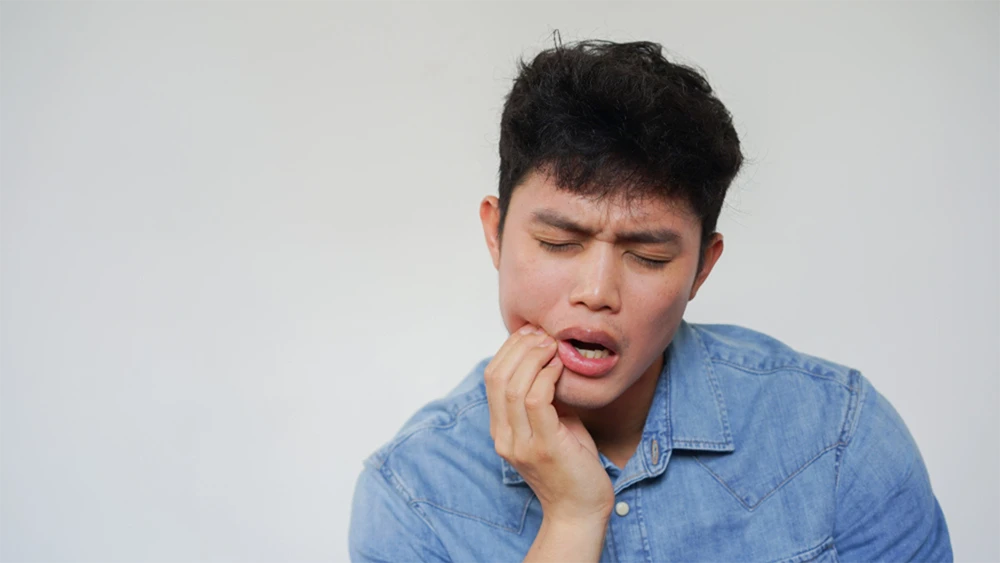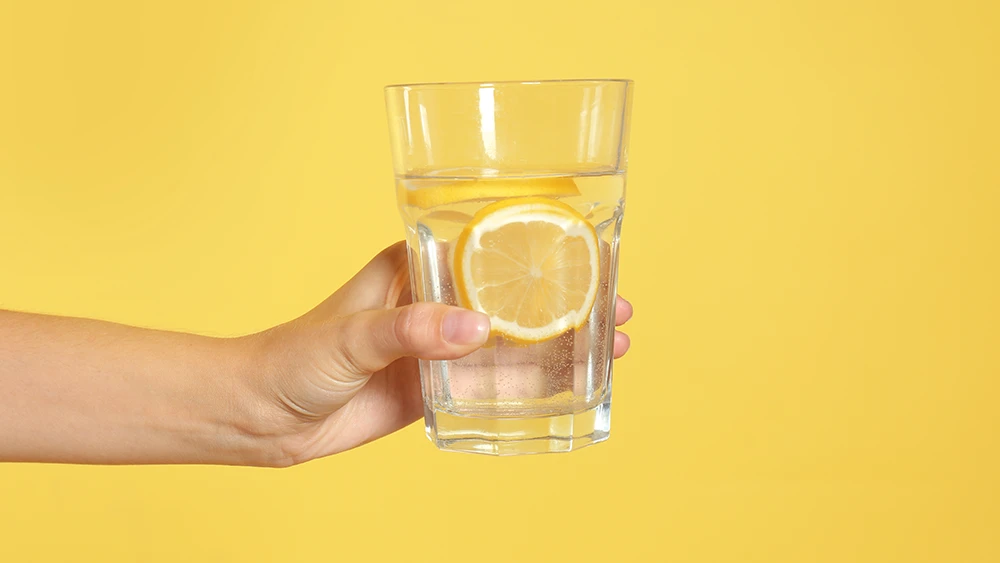Let’s face it- Dealing with a Dental Emergency is probably one of the worst things to have right about now (or in any situation actually). Living with and navigating around the effects of COVID-19 has brought about inconveniences and much anxiety. Lifestyle changes can lead to problems for your teeth. Fortunately, with early care and prevention measures, it is possible to prevent these issues affecting your teeth.
Bruxism (Teeth Grinding)
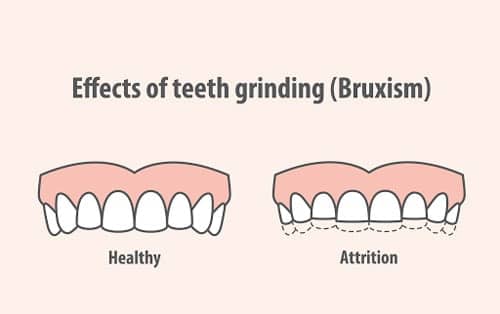
We are all too familiar with how the effects of stress can manifest physically. This season of work-related stresses is compounded with more frequent meetings and an increased workload from Working From Home. Parents who have to manage their children’s home-based learning (HBL) and their daily running of the household are constantly exhausted and more highly strung.
What Causes Bruxism
We live in stressful times, and it can take a significant toll on our health. Stress and anxiety are often contributing factors to teeth grinding and jaw clenching habits (also known as nocturnal bruxism). It does not always cause symptoms, but some people get facial pain and headaches, and it can wear down your teeth over time. Most people who grind their teeth and clench their jaw are not aware they’re doing it, as the bruxism forces are highest when they are sleeping at night.
Parafunctional habits such as nocturnal bruxism can exert significant amounts of force on the teeth. Teeth attrition (wear as a result of grinding) can range from mild to severe wear, giving rise to other dentofacial complications.
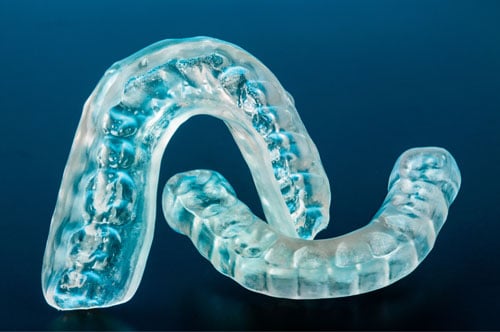
How to treat Bruxism
a) Bruxism Splint
One of the treatments we prescribe to our patients with bruxism is the use of a bruxism splint or a bruxism mouthguard. Depending on the practitioner’s mode of treatment, a bruxism splint could be rigid, or of dual-hardness. These splints are custom fit to your teeth to provide bracing and to equilibrate the bite forces that are exerted during the wear. Dentists routinely prescribe them as a maintenance appliance to protect existing restorations from wear and breakage as well.
b) Mouthguard
If you are diagnosed with bruxism, it would be wise to have a mouthguard prescribed and fabricated to prevent wear from progressing.
c) Crowns
In some cases where severe attrition or cracks have already formed, your dentist may advise for a crown to be done to adequately brace and protect the existing tooth structure from crack progression. This is usually done when fillings are extensive and do not adequately provide bracing for the natural tooth structure as well.
Cracked Teeth
Clenching and grinding can cause teeth to crack. While most teeth that present with craze lines do not progress into a cracked tooth, a crack in the tooth could well progress into a split tooth, thereby rendering the tooth unrestorable. A crack tooth in its early stages if detected and managed expediently can prolong its lifespan. However, if the crack is left alone to progress deeper into the root surfaces of the tooth, the tooth can no longer be treated effectively and has to be removed and subsequently replaced. Financial costs aside, the trauma of having to go through more complex treatment could have been avoided if regular follow-ups and preventive treatment is prescribed early.
Tooth Decay (Dental Caries)
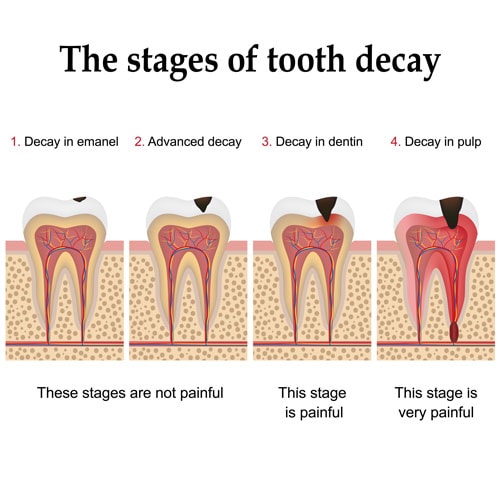
A sedentary lifestyle of WFH and constant snacking does not just affect your waistline, it could also increase the risk of dental decay. The food that we snack on generally contains some form of carbohydrates that when broken down would produce sugars. These provide nutrients and an optimal acidic environment for bacteria to thrive causing dental caries to form rapidly. Dental decay in its initial stages is treatable with fairly non-invasive procedures such as fillings and/ or preventive restorations. As the disease progresses, bacteria may infect the vital structures of the tooth, causing an infection of the pulp. A decay usually does not hurt until the nerve is affected, hence, pain is a poor indicator of disease progression.
Tips to prevent the development of dental decay
- Minimise snacking
Reduction of snacking and strictly keeping to your 3 daily meals allows time for saliva to regain its buffering capacity. Our saliva acts as a buffer by neutralising acids and protecting our teeth from softening and cavitating. - Avoid Brushing After A Meal
Do not brush your teeth immediately, especially after consuming acidic food such as sugary snacks and fruit juices. Wait at least 30 minutes as brushing can damage the tooth enamel that has been exposed to acid. - Hydrate Sufficiently
Drinking water (preferably tap, and boiled) can help replenish salivary flow to flush away the acids. Our fluoridated water also helps to remineralise and harden the outermost tooth structure. Drinking tea with no sugar and milk is fine as well, although some teas may cause external stains to form faster. - Brushing & Flossing Regularly
As usual, brushing and flossing well at least once a day is important for the prevention of decay and periodontal disease. Store-bought mouth rinse is not substitutes for good oral hygiene practices. Plaque that adheres to teeth requires physical removal and will not be removed by gargles. Mouthrinse may be prescribed by your dentist to reduce the initial bacterial load and acute periodontal inflammation. Do consult your dentist if in doubt.
Conclusion
The ultimate prevention of disease is more beneficial than a cure. More often than not, moderate and advanced dental diseases are irreversible, and treatment procedures in the advanced stages of dento-oral diseases may buy time for their survival rather than restore them to their original healthy condition.
Therefore prevention (i.e. early detection and management, regular routine checkups and maintenance, and a good home care regime) can help minimize the chances of disease progression, thereby reducing the need for urgent care.
FAQs
It usually is transient for young children in mixed dentition, however, most adults may require appliances and symptomatic relief to manage negative consequences of sleep bruxism.
There is at present, no effective treatment that “cures” or “stops” sleep bruxism permanently. Management is usually directed toward tooth/restoration protection, reduction of bruxism activity, and pain relief.
If patients have no adverse drug reactions or allergies, they are welcome to take whatever vitamins they want (best to be advised by their medical doctor). However, there have been no studies thus far that shows supplements or vitamins can help in relieving bruxism.
The food that we snack on generally contains some form of carbohydrates that when broken down would produce sugars. These provide nutrients and an optimal acidic environment for bacteria to thrive causing dental caries to form rapidly. Dental caries initially starts by a weakening of the outer lying enamel, causing it to soften as it loses its minerals. if left to progress without remineralising (or strengthening) the enamel, cavitation can occur.


